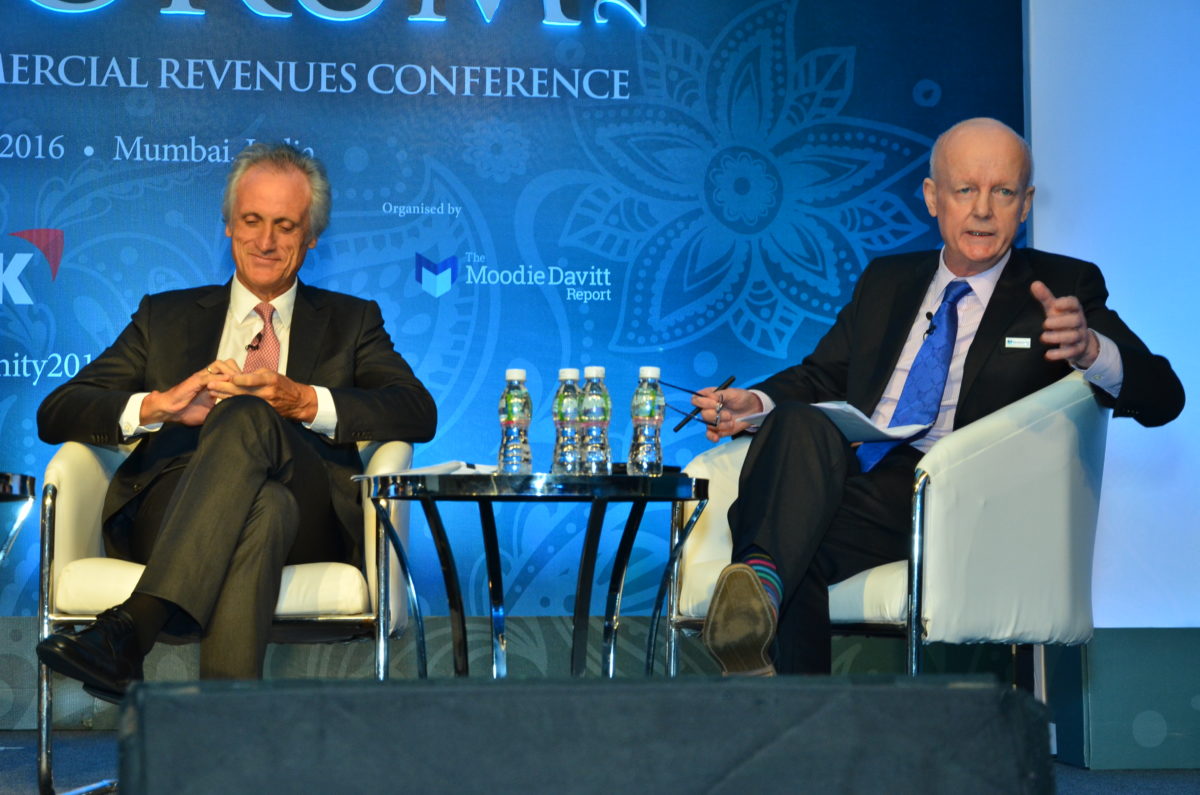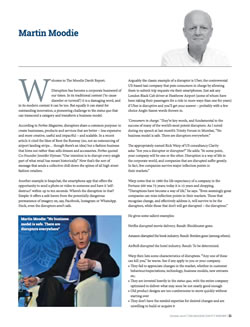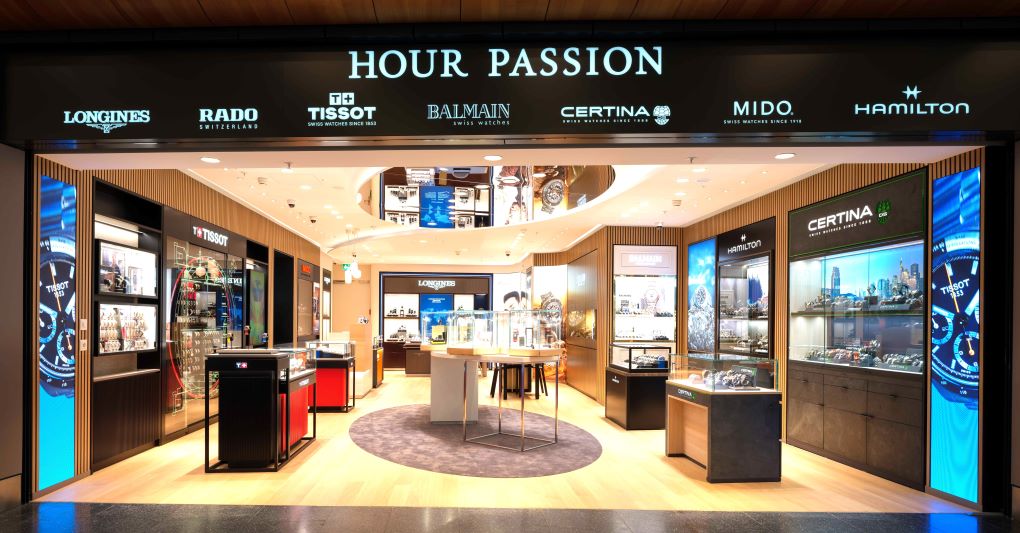Disruption has become a corporate buzzword of our times, writes Martin Moodie. In its traditional semantic context (‘to cause disorder or turmoil’) it is a damaging word, and in its modern context it can be too. But equally it can stand for outstanding innovation, a pioneering challenge to the status quo that can transcend a category and transform a business model.
According to Forbes Magazine, disruptors share a common purpose: to create businesses, products and services that are better – less expensive and more creative, useful and impactful – and scalable. In a recent article it cited the likes of Rent the Runway (no, not an outsourcing of airport landing strips… though there’s an idea) but a fashion business that hires out rather than sells dresses and accessories.
Forbes quoted Co-Founder Jennifer Hyman: “Our intention is to disrupt every single part of what retail has meant historically.” Now that’s the sort of message that sends a collective chill down the spines of all high street fashion retailers.
Another example is Snapchat, the smartphone app that offers the opportunity to send a photo or video to someone and have it ‘self-destruct’ within up to ten seconds. Where’s the disruption in that? Simple: it offers a safe haven from the potentially dangerous permanence of imagery on, say, Facebook, Instagram or WhatsApp. Heck, even the disruptors aren’t safe.
Arguably the classic example of a disruptor is Uber, the controversial US-based taxi company that puts consumers in charge by allowing them to submit trip requests via their smartphones. Just ask any London Black Cab driver at Heathrow Airport if Uber is disruptive and you’ll get your answer – probably with a few choice Anglo-Saxon words thrown in.

‘Consumers in charge.’ They’re key words, and fundamental to the success of many of the world’s most potent disruptors. As I noted during my speech at last month’s Trinity Forum in Mumbai, “No business model is safe. There are disruptors everywhere.”
The appropriately named Rick Warp of US consultancy Clarity asks: “Are you a disruptor or disruptee?” He adds: “At some point, your company will be one or the other. Disruption is a way of life in the corporate world, and companies that are disrupted suffer greatly.In fact, few companies survive major inflection points in their markets.”
Warp notes that in 1960 the life expectancy of a company in the Fortune 500 was 75 years; today it is 15 years and dropping“Disruptions have become a way of life,” he says. “Even seemingly great companies can miss inflection points in their markets. Those that recognise change, and effectively address it, will survive to be the disruptors, while those that don’t will get disrupted – the disruptees.”
 He gives some salient examples:
He gives some salient examples:
Netflix disrupted movie delivery. Result: Blockbuster gone.
Amazon disrupted the book industry. Result: Borders gone (among others).
AirBnB disrupted the hotel industry. Result: To be determined.
Warp then lists some characteristics of disruptees. “Any one of these can kill you,” he warns. See if any apply to you or your company:
- They fail to appreciate changes in the market, whether in customer behaviour/expectations, technology, business models, new entrants etc.
- They are invested heavily in the status quo, with the entire company optimised to deliver what may soon be not nearly good enough without starting over
- Old product designs are too cumbersome to move quickly without
starting over - They don’t have the needed expertise for desired changes and are unwilling to build or acquire it
- Sacred cows and old biases flourish, affecting even the best of intentions to change.
Now contrast that checklist with characteristics of disruptors:
• They recognise the possibilities of a new reality and refuse to be slaves to the past
• They deal with the installed base issue to regain quickness
• They fully commit to appropriate initiatives
• They modify their investment profiles to fit
• Regular check-ups and adjustments keep old biases at bay
• Critically, they are either new companies or are willing to find a way to recapture their entrepreneurial heritage.
Just in case your alarm bells are not already ringing, Warp warns: “Don’t be a disruptee. If the market is changing or you see the potential for change, leading is far more effective than trying to maintain the status quo. It’s also a lot more fun.”

What a brilliant summing up. And how salient it is to the travel retail sector, in general and in the debate at The Trinity Forum, in particular. I repeat two of my key opening address questions: “How does the travel retail channel respond to a world increasingly dominated by e-commerce, a competitive threat that simply didn’t exist through our
industry’s first half-century? And how does it ‘future proof ’ itself to avoid going the way of some other seemingly rock-solid business models?”
Those are monumental questions; and they’ve descended on our industry with frightening speed. Remember, when the first Trinity Forum was held in 2003, Facebook had not been founded. Nor Instagram. Nor Twitter, nor YouTube, nor PinInterest. No Tumblr. No TMall. No TBao Marketplace. E-commerce was in its infancy, considered by most consumers to be high-risk, fanciful, insecure; shunned by most brands as shadowy and uncontrolled; dismissed by most retailers as something to worry about another day.
That day wasn’t long in coming. Today Chinese consumers can order just about anything they desire from Alibaba online platforms such as Taobao Marketplace and T-Mall and have the goods delivered straight to their homes. They have steadily improving confidence in both the price and authenticity of the product, especially as more premium and luxury brands are striking direct relationships with Alibaba (the biggest of brands, including Cartier and Louis Vuitton, now do).
 In his searingly incisive Trinity Forum address, Fraport Executive Vice President Multi-Channel Kai Schmidhuber rationalised a pioneering tripartite inflight pre-order partnership with national carrier Lufthansa and airport retailer Gebr Heinemann by saying: “For us it was about being the first mover in that concept before others come. We have some serious issues with, for example, Alibaba and Alipay. Most of our Chinese passengers pay for their airline tickets with Alipay. So Alipay knows much further in advance than us when their customers are arriving at Frankfurt Airport. And Alibaba and Alipay send them offers, working together with some other retail partners outside the airport.”
In his searingly incisive Trinity Forum address, Fraport Executive Vice President Multi-Channel Kai Schmidhuber rationalised a pioneering tripartite inflight pre-order partnership with national carrier Lufthansa and airport retailer Gebr Heinemann by saying: “For us it was about being the first mover in that concept before others come. We have some serious issues with, for example, Alibaba and Alipay. Most of our Chinese passengers pay for their airline tickets with Alipay. So Alipay knows much further in advance than us when their customers are arriving at Frankfurt Airport. And Alibaba and Alipay send them offers, working together with some other retail partners outside the airport.”
In other words, Fraport is not prepared to be the disruptee. Disrupt your own model if you have to, but do not be the victim (marvellously, when I asked Schmidhuber whether there were arguments as to who ‘owned’ the customer spend, he replied: “We said, ‘Let’s try it first – and then cut the cake. Let’s find out if there is a success before we argue for the next five years about who gets which slice of the cake.”)
Pertinently, and understandably, his and my comments prompted some delegates to suggest we were prophets of doom. Anything but. Travel retail has plenty of assets that online retail can never have – touch, taste, feel, smell, emotion, service, exclusivity. But it must marry those virtues with the realities of a revolution in human communication as profound as the invention of the printing press, radio or television.
As Schmidhuber said: “Alibaba, Amazon, Alipay are redefining what we do every day. Whatever you do at an airport, these pure players are your competitors.” As a pioneer of digital media, I speak from experience – to be the disruptor is an infinitely more exhilarating and ultimately rewarding experience than being the disruptee.












